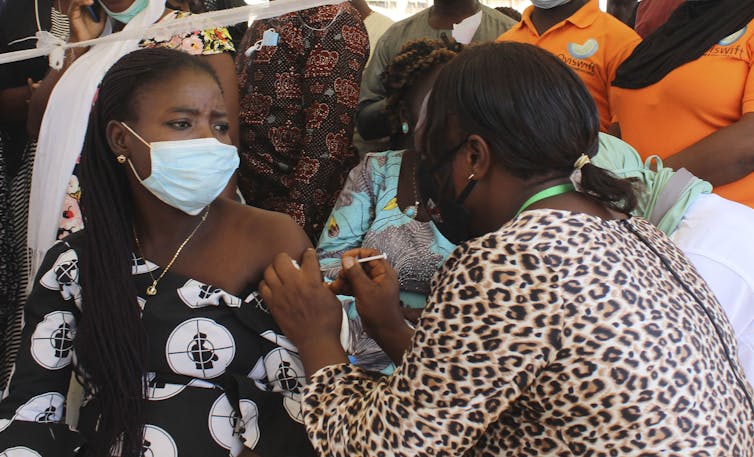By Badriyya Yusuf, Queen’s University, Ontario
- Ottawa’s travel ban against African countries made clear its underlying policy: What matters is not your test result, but where you’ve been. It’s yet another example of anti-Africa discrimation
Few people would consider airports to be arenas of power plays among nations.
But the reality is that airlines and border control agents are often a country’s first line of defence. Airports can be where foreign policy decisions are subjected to experiments and where, according to Kenyan political analyst Nanjala Nyabola, “the realities of privilege and race in travel are laid bare.”
I discovered this recently during my travel back to Canada from an Omicron-related red-listed country. In retrospect, the journey was a cross between a scene from Steven Spielberg’s 2004 film The Terminal and a chapter from Nyabola’s book, Travelling While Black.
Both works draw on the intersections between race, gender and class in international travel.
Policy aimed only at African countries
My personal experience involves the Canadian government travel policy — designed to address the COVID-19 Omicron variant — that targeted several African countries. It went into effect on Nov. 26, 2021, and by Dec. 18, 2021, was deemed to have “served its purpose and no longer necessary” given Omicron was present in countries around the world.
Nonetheless, the policy is still worth analyzing because such measures don’t occur in a vacuum — they reflect historical precedents and shape future policies. There is a need to examine whether the policy ever truly served the interests of Canadian citizens.
I was in Nigeria on Nov. 26, 2021, when the government of Canada “enhanced” its border measures to “reduce the risk of the importation and transmission of COVID-19 and its variants.”
This was done by placing additional requirements on Canadian citizens and permanent residents returning from red-listed countries, defined as having a particularly high risk for new and emerging strains of COVID-19. The only countries on the list were African, even though other nations had higher COVID-19 numbers and the variant was present in those nations at the time.

Dubious claim
Dr. Theresa Tam, Canada’s chief public health officer, justified the ban on African countries on the basis of low vaccine coverage rates and uncertainty of “their ability to detect and respond [to the variant].” This claim and other African travel bans have been criticized as not being based on scientific evidence.
The Public Health Agency of Canada (PHAC) has repeatedly failed to provide data to support the policy.
An editorial published in the medical journal The Lancet established that the Omicron variant was identified as a result of complex sequencing work done in South Africa when some of the most technologically advanced western countries were unable to conduct the same genome sequencing tests required. Furthermore, it highlighted that unless borders are sealed to travellers from all nations, selective travel bans don’t work.
On Nov. 30, 2021, Canada added Nigeria to the red list. Additional measures required of travellers included enhanced testing, screening and being placed in a designated quarantine facility upon arrival in Canada — regardless of vaccination status or previous test results.
Canada also added an unusual requirement for a valid negative test from a third country within 72 hours of departure to Canada. This measure has received the most criticism from many Canadians, scientists and experts. It meant additional expense and inconveniences for Canadian travellers, including having to travel through insecure and conflict-ridden environments.
Tug of war between airlines, authorities
Despite having been tested in Nigeria, I decided to have my third-country testing done in the United Kingdom.
I assumed PHAC would not have problems with a non-African lab’s test. However, the COVID-19 testing centres at Heathrow Airport are not inside the airport itself, but required entry into the U.K.
This became a problem, as the country no longer allowed entry for non-residents travelling from red-listed countries. My attempts to get a COVID-19 test became a tug-of-war between British Airways and the UK Border Agency. There was much confusion about what the rules were and how to humanely enforce them. I was initially refused entry, which was devastating after more than six hours flying with a toddler.
Ironically, neither my fully vaccinated status nor multiple negative tests mattered to PHAC upon arrival at Toronto’s Pearson International Airport. I was tested at the airport and we were taken to a designated quarantine facility.
The sub-standard conditions in these facilities — especially the lengthy wait times for test results and for authorization to leave from PHAC — have received a lot of media coverage.
More testing centres needed most of all
How exactly did any of these measures serve their supposed purpose? Canadian COVID-19 testing centres were backlogged because the focus was on requiring hundreds of travellers to get re-tested and quarantined, instead of taking more proactive domestic measures to ensure Canadians had easy access to testing centres.
Although not all African countries were placed on the red list, Dr. Howard Njoo, Canada’s deputy chief medical officer of health, admitted to factors other than science influencing cabinet decisions.
He said:
“We work … to put together the best advice we can based on the science. Decision-makers take that into account but we recognize there are other considerations at play as well, beyond just strictly sort of technical public health advice that we may be giving to ministers.”
The African travel bans highlight underlying issues in global justice, from vaccine diplomacy and intellectual property barriers to the systemic refusal to recognize African competencies and agency.
It all clearly boils down to what the PHAC agent at Pearson told me: “What matters is not your test result, but where you’ve been.”
Nigerian-born Badriyya Yusuf is a PhD Candidate/Researcher in International Relations, Queen’s University, Ontario
The above article was first published in The Conversation, January 13, 2022
